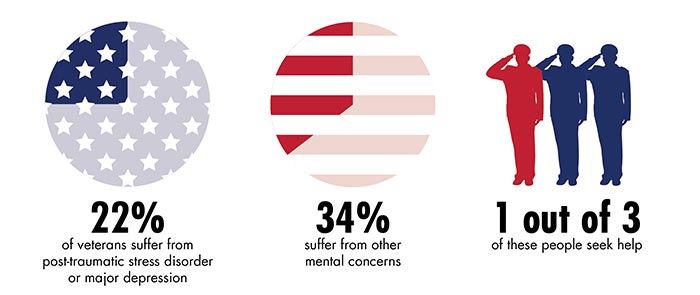The October 3 information session focused on several issues facing returning vets, such as post-traumatic stress disorder.
by Stephen Levine
While the country cheers on our veterans upon their return, many people may not consider the difficulties former soldiers face at home. This was the topic of discussion for University College’s information session entitled “Safe Talk,” which took place on October 3 at the Ruth S. Harley University Center.
John Javis, co-director of the Veterans Mental Health Coalition and director of special projects at the Mental Health Association of Nassau County, led the discussion and covered topics such as post-traumatic stress disorder (PTSD), traumatic brain injury and readjustment to student and professional life, as well as other issues plaguing returning veterans.
According to Mr. Javis, these problems are especially prevalent on Long Island because Nassau and Suffolk counties combined are home to more than 130,000 veterans. Military enlistment has also seen a 35-percent increase since 9/11, further exacerbating the mental health and social problems that veterans have experienced upon their return.
| *Figures from a 2011 study conducted by the RAND Corporation in conjunction with the New York State Health Foundation on New York veterans returning from Iraq and Afghanistan. |
Mr. Javis provided a few reasons for veterans’ reluctance to seek help. Veterans may worry that even admitting that they have a mental health disorder will severely limit their employment opportunities. Veterans who have PTSD may be hesitant to be forthcoming on post-deployment surveys in fear that it might jeopardize employment opportunities.
The national statistics surrounding this issue are staggering: Twenty-two veterans a day commit suicide—a number twice the suicide risk of nonveterans. The deceased in 50 percent of military suicides were in a failed relationship, 25 percent of these suicides were caused by alcohol consumption and 68 percent were caused by self-inflicted gunshot wounds.
Despite these shocking numbers, there are still ways to help. Friends and loved ones of veterans should pay attention to the signs, such as poor sleep, lack of appetite and drastic mood changes. It’s also important to listen, ask questions and engage in conversation to gauge how a veteran is feeling.
For those in need of immediate attention, contact the National Suicide Prevention Lifeline at 800.273.TALK (800.273.8255), which can be accessed round-the-clock throughout the year. For a more local response, call the Mental Health Association of Nassau County, which is open from 9:00 a.m.–6:00 p.m. every day, at 516.504.HELP.
For further information, please contact:
Todd Wilson
Strategic Communications Director
p – 516.237.8634
e – twilson@adelphi.edu
